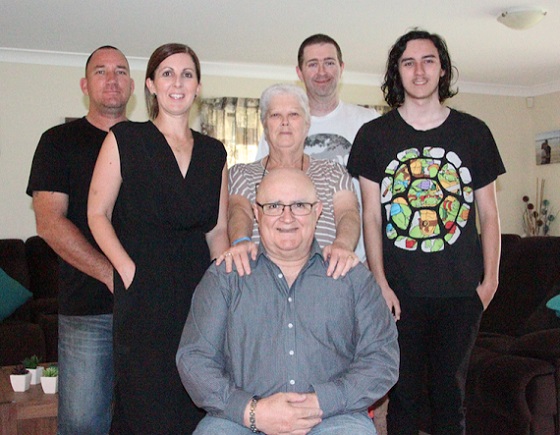Gotta love the human spirit that refuses to be beaten!
After a misdiagnosis of epilepsy, Australian-based Mick Carmody writes, “I was diagnosed with a common form of dementia in people who are under the age of 65 called – fronto-temporal lobe dementia or FTD.”
His wife and daughter were “walking on eggshells and trying to do the right thing, so I would not get cranky and snap at the drop of a hat,” admits Mick during his opening keynote at last year’s Alzheimer’s New Zealand and Alzheimer’s Disease International Regional conference.
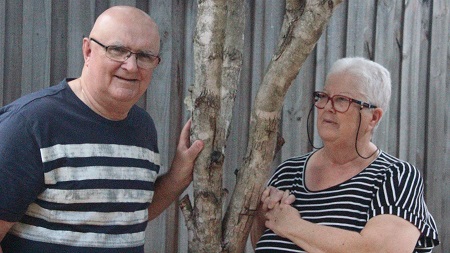 Sixty-one-year-old Mick was diagnosed four years, ago. His wife, Sue adds, “He was forgetful. He kept denying he was told something the previous day.” Mick adds, during a recent Google Hangouts Video call, “I’m still getting a bit snappy and once it’s brought to my attention, I try to fix it straight away. It’s hard for me to come to terms with knowing that I’m hurting the ones I love.”
Sixty-one-year-old Mick was diagnosed four years, ago. His wife, Sue adds, “He was forgetful. He kept denying he was told something the previous day.” Mick adds, during a recent Google Hangouts Video call, “I’m still getting a bit snappy and once it’s brought to my attention, I try to fix it straight away. It’s hard for me to come to terms with knowing that I’m hurting the ones I love.”
“When I was told by the geriatrician, ‘The average lifespan of someone with FTD is five to seven years. It could be 10, 20 years, or 6 months. The best advice I can give you is to get your life in order and enjoy yourself,’ the part that resonated for me was the five to seven years. I went down a spiral – into a black hole. I was angry at myself. I felt worthless. How can I put my family – my wife and children, through this? I will be a burden to them. I’ll be better off not a burden.”
Having never written poetry before, Mick began writing. One of his 300 poems was published in a national quarterly for people with younger-onset dementia. This led to an invitation to Melbourne to join a national dementia research group.
There, he was introduced to Dementia Alliance International (DAI) composed entirely of people with dementia, and its co-founder Kate Swaffer. He joined one of the online support groups. It met at 5am on Friday mornings for him. Facilitated by the late Dr. Richard Taylor, it was composed entirely of Americans with dementia. Mick felt intimidated, initially. He sat and listened until Richard invited him to share his story.
Soon, he learned he was among people like him. No one would judge him. They all understood and spoke the language of dementia. He learned, “I am still here. I am still me.” This marked a turning point to focus on living instead of dying with dementia.
“What inspired me the most was 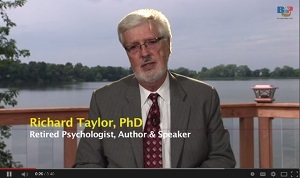 Richard Taylor’s legacy to have as many support groups around the world. Three weeks before he died of cancer and in excruciating pain, he said to me, ‘Mick Carmody, I am so proud of you. I am so proud of everything you’ve achieved.’ I said, ‘Richard, I am going to do everything I can to keep your legacy alive, for as long as I have breath in me.’ Richard replied, ‘Thank you, Mick and his screen went black.’”
Richard Taylor’s legacy to have as many support groups around the world. Three weeks before he died of cancer and in excruciating pain, he said to me, ‘Mick Carmody, I am so proud of you. I am so proud of everything you’ve achieved.’ I said, ‘Richard, I am going to do everything I can to keep your legacy alive, for as long as I have breath in me.’ Richard replied, ‘Thank you, Mick and his screen went black.’”
Mick Carmody was awarded the first
DAI Richard Taylor Advocates Award.
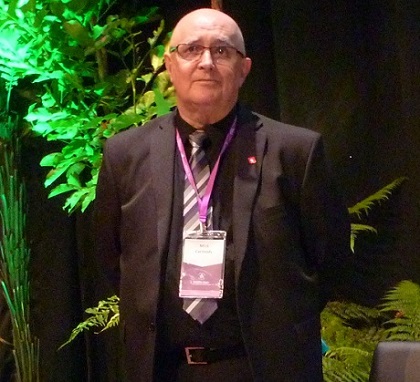 Mick, like others with dementia featured in the Voices with Dementia column, feels distressed when people say, “You don’t look like you have dementia.” During his New Zealand keynote, he illustrates with the kind of comments he hears, like, “My grandmother had dementia and she looked nothing like you. Besides, you can talk like we do.” Mick replies, “Thank goodness, I do not look like your grandmother! Can you please have a look around the room and tell me, who has dementia just by looking at them?”
Mick, like others with dementia featured in the Voices with Dementia column, feels distressed when people say, “You don’t look like you have dementia.” During his New Zealand keynote, he illustrates with the kind of comments he hears, like, “My grandmother had dementia and she looked nothing like you. Besides, you can talk like we do.” Mick replies, “Thank goodness, I do not look like your grandmother! Can you please have a look around the room and tell me, who has dementia just by looking at them?”
Today, Mick Carmody serves as the Vice Chair of DAI and the Global Support Group Manager. He hosts support groups, worldwide. He works beyond full time and goes the extra mile to help a person in need. Sometimes, that means taking a call at 2:30am or 4:00am. He often works 60 – 70 hours a week, unpaid!
When asked, he says, “Things that please me the most are my family and seeing someone come to the support group as a new member and say, ‘I wish I would have found this a long time ago.’ And when they finish the meeting, they say, ‘This is so empowering.’ All we do is sit and talk. But we’re talking with like-minded people who don’t judge.”
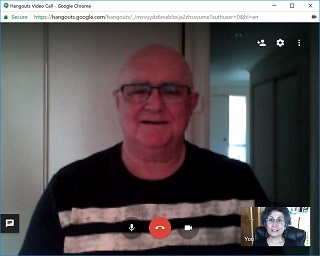 Recently, he suffered an aneurism. He also lives with primary progressive aphasia (PPA), which affects his speech. During our call, he took time to answer. Yet, this Global Support Group Manager for DAI figured out how we could have a video call via Google Hangouts.
Recently, he suffered an aneurism. He also lives with primary progressive aphasia (PPA), which affects his speech. During our call, he took time to answer. Yet, this Global Support Group Manager for DAI figured out how we could have a video call via Google Hangouts.
People with dementia have much to teach us if we’re willing to listen and learn. Thank you, Mick.
Click on The Power of people with dementia for a PDF copy of Mick Carmody’s slides used in his November 2016 keynote.
The power of people with dementia – an interview with Mick Carmody is published at the DAI site.
[TCV Update 9/27/2022: DAI URLS updated]


